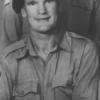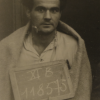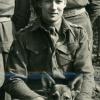29. 7. 43. 6461257. H.Q. Coy. A/T. L/Cpl. Osborne, A. 1st Parachute Battalion. A.A.C. B.N.A.F.
Dear Bill, We have had permission from General Montgomery himself, that at this date or any time after, we can write of our adventures in North Africa and in Sicily. You can guess that we have had plenty to do in N. Africa. It is a very long story, more than I would attempt to write about, but you would have read most of it in the newspapers, so I will make it brief.
The paratroopers are the only troops who can honestly say they fought on every front in North Africa, and have the record of killing and capturing more Germans than any other troops in that campaign. After the campaign, we were personally inspected and congratulated for our work by Montgomery-Eisenhower-Anderson-Alexander and a letter came from the King, and all addressed us as ‘Red Devils’, a nickname given to us by the Germans.
Now for Sicily. Two weeks before the invasion of Sicily, we were told to get ourselves ready for a job. For a fortnight we worked hard, and each man was given his orders just what to do. They wanted no mistakes on this job, it meant so much to a speedy ending.
The morning of the job we got ready, every man fit and keen. We made up little bundles of our personal belongings and attached a little note – “If I fail to return please forward this to my mother.” These were left behind in our kit bags. Time came when we had to part camp for the airfield. Men who couldn’t go, owing to being wounded in other actions, wished us luck.
We got to the airfield where we met our crew, and we got the information from the pilot just what he was going to do on the final run-in. Then we got the last boost up by our commander. “Men, you know your jobs and just what you are expected to do. At all costs it will be done. Don’t let anything get in your way. Whatever you encounter you know just how to deal with it. The enemy have seen you in North Africa. He knows you, doesn’t like you, and will do all he can to stop you, but he will not. That is all, gentlemen. Good luck, God’s speed and a safe return.”
It was 8 p.m. and at 8.30 p.m., we were due to start, and scheduled to arrive in Sicily, behind enemy lines, at 10.30 p.m. So we all assembled and wished each other luck. The 8th Army was to relieve us after 12 hours, although we weren’t worrying about that part, because we could depend on the 8th Army. After a time flying, we saw Malta, “Not far to go, lads. Hook up, forty minutes to go.”
Just as we approached the cost of Sicily, we got keyed up for a hot reception from enemy flak. We got it okay, more than we expected. Flashes came from all over the place, it was terrifying.
During this time our aircraft was hit. The port side engine choked up and stopped. From then on the aircraft was bumping, swaying, diving and climbing to dodge the flak. We were tossed from one side of the plane to the other. We knew that any second it would be time for us to jump, so we scrambled to the door the best way we could, and to look down at that sight was no joke. Then on came the Red light (“Action Stations”), in a second on came the Green light (“Go”) and out we went. It was just like jumping into an inferno, the countryside for miles was ablaze, tracer bullets were coming up at us from enemy machine-guns on the ground.
Floating down by parachute, thinking any time I would be dead before I touched down, it seemed weeks before I hit the deck. Actually, it was only a matter of seconds. It does not take long to get down from a 300 foot drop, but it was terrifying. Then I gave a sigh of relief when I hit the deck. It took me several seconds to pull myself together as I had a rough landing. Then I went to find my detachment, two men.
I wasn’t sure of my position, but I went forward about 200 yards, took a look round, but couldn’t see anything, but could hear enemy voices. I didn’t fancy that at all, as I had no weapons, just two hand grenades and a fighting knife, but I scrambled through the bush under cover of darkness to my original position and tried another way.
Then I saw a parachute hanging over the telegraph wires. I stopped and a quivering uncertain voice came from a bush, “Who’s that?” I gave the password. It was one of my men, and he had a hand grenade ready to throw at me if I had been one of the enemy, because he was as scared as I was. We had another look round, and we still could hear enemy voices, even nearer and more of them. Then I looked for some nice cover and said, “Let’s go. It’s dangerous hanging around near parachutes.” So, we went to find the last man. He wasn’t far away, but slightly hurt from a bad landing, although it wasn’t much.
We still had to get to our containers for our weapons, because until we got our weapons, we couldn’t defend ourselves. My heart went down in my boots as the parachute of the container failed to open and crashed to the ground. The weapons were absolutely unserviceable. All this time we could still hear enemy voices quite near and bullets were flying all over the place, you can guess what we felt like. From the time we jumped from the plane all this happened in 15 minutes. We then made for the objective, a bridge about 1000 yards away, and on our way we came across a reserve supply of weapons, so we soon armed ourselves with one Bren gun and two rifles. We got about 200 yards from the bridge, then the attack started and we let fly with all we had. A small tank, followed by an armoured car and a truck loaded with ammo of the enemy, came down the road.
There was a Section on my left, and it didn’t take them long to put them out of action. One of the lads fired a paratroop anti-tank gun at the tank, and two cannon [Gammon] bombs were thrown at the other two vehicles. These are deadly weapons and smashed them to bits, killing all the drivers. The taking of the bridge only took us half-an-hour, but it was stiff fighting, as it was well fortified. We took the bridge over and got in position for a counter-attack, because he always came back for more. There were some awful sights on the bridge, mostly enemy, although we didn’t worry about that. Our biggest worry was holding the bridge, that is always the hardest part. So, I said, “Right, lads, get yourselves ready, for the hardest part is coming, holding the bridge, as he’s sure to come back, and when he does, he comes back with plenty.”
We didn’t know it at the time, but he dropped paratroops of his own near the bridge, with the idea of giving us a surprise attack first thing in the morning, but we were prepared for anything. At first light next morning, he came out of his hiding place and again the fireworks started. But, fortunately he walked slap-bang into a trap, so it didn’t last long, and they were slaughtered. This was not the end though, as he was sure to come again, and we were all by ourselves. The 8th Army was still pushing inwards towards us from the coast, but we didn’t expect as much opposition as we got.
Paratroops have no transport and can only take as much ammunition as a man can carry. Too many of these attacks and we would have been out of ammo. Then the order came, “If he comes again, hold on to your ammo”. It was nice and quiet for some hours, so we settled down waiting for him to come back, for he meant to get that bridge or blow it up. On the bridge there was a long-range gun of the enemy, and I was asked to man it with my two men, so we did so.
We were in position with this gun for about half-an-hour, when our officer saw German lorries loaded up with infantry. We loaded up the gun and let them have four shells and it shook them up, and forced them to get off the lorries, so of course they had to come to us by foot. The gun wasn’t much further use, so I returned back with my men to my original position, a pillbox. I took a Bren gun and my two men had rifles. Just before this we got contact by radio, with the leading troops of the 8th Army. They were still ten miles away. We knew then that we had to hold on much longer, because this wasn’t the news we expected. It was bad, as our ammo was almost finished, but we had to do our best. The enemy came closer and closer until he was at a nice range for us to fire, so away we blazed again. We had met these birds before in North Africa, Storm Troops, Herman Goering Regiment. They did their best to get through, but we knocked them off like flies. But the Germans poured on a heavy attack then, forcing us to withdraw.
Still in danger, fired on by small isolated machine-guns, we eventually got to a deep ditch and stayed the night there. Next morning, we moved on, got to a road and met some men of the 8th Army! They told us the good news that the 8th Army had pushed on through the night, the bridge was okay and still ours! Later, General Montgomery visited the 1st Parachute Battalion and thanked us, saying, “You have done your bit only too well!”
BATTLE gives its grateful thanks to the Osborne family for helping to compile this article.
Source:
Reproduced in BATTLE Annual 1983, supplied by Bob Hilton.
Read More




Latest Comments
There are currently no comments for this content.
Add Comment
In order to add comments you must be registered with ParaData.
If you are currently a ParaData member please login.
If you are not currently a ParaData member but wish to get involved please register.